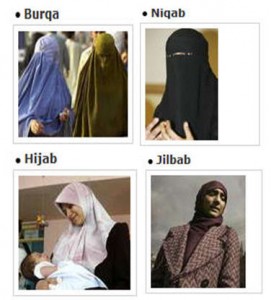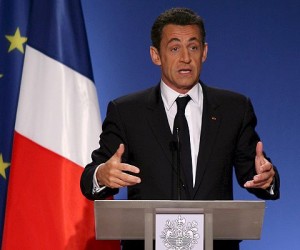In our country, we cannot accept that women be prisoners behind a screen, cut off from all social life, deprived of all identity… The burqa is not a religious sign; it’s a sign of subservience, a sign of debasement – I want to say it solemnly … it will not be welcome on the territory of the French Republic.
(French President Nicolas Sarkozy, London Guardian, June 22, 2009)
 Whether or not women should be allowed to wear burqas or niqabs in public is a very controversial and contentious issue.
Whether or not women should be allowed to wear burqas or niqabs in public is a very controversial and contentious issue.
I do not think they should be allowed to wear either of them. But I see nothing wrong with women wearing Hijabs or jilbabs.
On the other hand, I do not agree with President Sarkozy’s patronizing pronouncements on the gender implications of the burqa. Not least because his declaration seems premised on the demonstrably false assumption that women who wear burqas in France are no more educated or liberated than those who wear them in Afghanistan (in places where the Taliban still rule).
I appreciate the differences between Sharia laws that clearly oppress women in places like Afghanistan and those that appear to subjugate them in places like Iraq … and France.
Moreover, no matter how well-intentioned, I do not think any Western government should be dictating to mature Muslim women what constitutes appropriate religious garb; especially if there’s nothing inherently untenable (legally or socially) about that garb.
(Sarkozy proposes ban on the burqa, The iPINIONS Journal, July 1, 2009)
 This, in part, was how I expressed my disagreement when Sarkozy first proposed banning burqas in France a year ago. Because I believe that concerns about law and order and national security present far more compelling reasons for governments to ban them.
This, in part, was how I expressed my disagreement when Sarkozy first proposed banning burqas in France a year ago. Because I believe that concerns about law and order and national security present far more compelling reasons for governments to ban them.
For example, it would rather defeat the purpose of installing CCTV cameras in every nook and cranny of public space, like most cities around the world are doing, if people could walk around with their faces completely covered. After all, terrorists and common criminals have been known to wear burqas as effective disguises.
But citing religious, cultural and gender concerns in this context is fraught with political conflict. And nothing demonstrates this quite like those opposing this ban arguing that, instead of liberating women as Sarkozy argues, banning burqas would actually oppress them:
A complete ban on the covering of the face would violate the rights to freedom of expression and religion of those women who wear the burqa or the niqab in public as an expression of their identity or beliefs.
(John Dalhuisen, Amnesty International’s expert on discrimination in Europe, Reuters, July 13, 2010)
In any case, I understand why the lower house of the French parliament voted 335 to 1 a week ago today to ban “any veils that cover the face”. The French Senate is expected to vote in similar fashion in late-September; then the ban becomes law.
For the record, several European countries, including Germany, Belgium and Italy, seem poised to follow France’s lead in banning the burqa. And even though the U.S. Constitution purports to grant Muslim women the (religious) freedom to wear burqas, I suspect that will change as soon as someone wears one as a disguise to pull off a terrorist act. (But contrary to popular belief, a woman cannot get a driver’s license wearing a burqa even in America.)
The instructive irony in this context, however, is that, as best I can tell, only two countries in the Muslim world (Saudi Arabia and Kuwait) require women to wear the burqa. So, at least in this sense, Sarkozy is right, it’s not “a religious sign”.
Related commentaries:
Sarkozy proposes ban on the burqa
Leave a Reply
You must be logged in to post a comment.